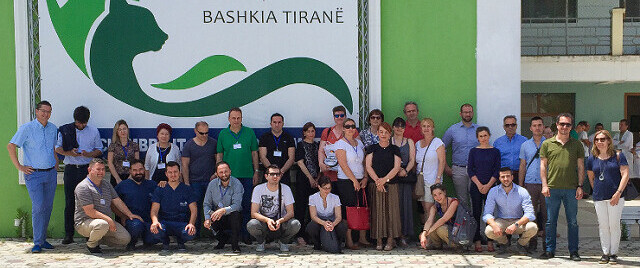The Second OIE Regional Workshop on stray dog population management for Balkan countries (SDB2) took place from 14 to 16 June 2016 in Tirana (Albania).
This workshop is an integral activity of the Regional stray dog Roadmap on stray for Balkan Countries, launched in June 2014 with the objective to become compliant with OIE Chapter 7.7 of Terrestrial Animal Health Code by 2025.
Workshop objectives
The overall objective of the SDB2 workshop was to support countries to comply with the OIE intergovernmental standards on stray dog population control (Chapter 7.7) and rabies (Chapter 8.11). Given its pertinence for the region and in the context of the recently adopted Global Framework for the elimination of dog-mediated rabies, the Workshop included an increased focus on the control of dog-mediated rabies compared to the SDB1.
More specifically, the objectives of the SDB2 workshop were to:
Workshop presentations:
Session 1 — Setting the scene session
OIE new developments on Animal Welfare (OIE)
OIE Platform for Animal Welfare in Europe – New development since 2014 (OIE and IZSAM Teramo)
Stray dog as a societal issue (IZSAM Teramo)
Session 2 — Country reports
Albania
Bosnia and Herzegovina
Bulgaria
Croatia
Former Yugoslav Republic of Macedonia
Greece
Kosovo
Montenegro
Romania
Serbia
Turkey
Session 4—Addressing the Challenges
Topic 1 — Finalizing the Assessment Phase – How to conduct a stray dog survey
Surveying roaming dog populations (World Animal Protection)
How to conduct a stray dog survey – Country experience (FYR Macedonia)
Topic 2 — Legal/illegal trade of dogs
Dog Trade in Europe (FVE/FECAVA)
Topic 3 — National framework on stray dog population control
How to design a Framework that incorporates all actors? (IZSAM Teramo)
Topic 4 – Identification and registration of dogs
Key requirements for a secure and compatible system of identification and registration of dogs in Europe (VIER PFOTEN)
The national dog registration database – Country experience (Croatia)
Session 5—Designing a three-year Roadmap
Elements of a comprehensive Stray Dog population control Strategy (RSPCA)
Evidence-based dog population control at the local level: an example of good practice from Serbia (ORCA)
Session 6 — Closing session
Next steps
As the next steps countries are expected:
